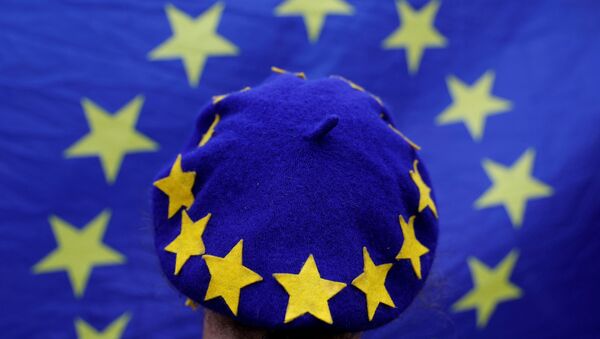Theresa May's government, which said before June's general election it was willing to leave the single market, appears to have carried out another U-turn with the proposal.
The position paper was posted on the Department for Exiting the European Union's website on Tuesday, August 15.
Today we have unveiled a new paper setting out proposals for our future customs relationship with the EU https://t.co/IY1JyN6wVP pic.twitter.com/emKYJLr8Ht
— Exiting the EU Dept (@DExEUgov) August 15, 2017
The Chancellor, Philip Hammond, said the proposals were "ambitious."
"They set out arrangements that would allow UK businesses to continue to trade with their European partners in the future, while expanding their markets beyond the EU and in the near term they will reassure people and companies that, the day after we leave the EU, they will still be able to go about their business without disruption as we make a smooth transition to our bright future outside the EU and deliver a Brexit that works for Britain," he added.
The EU is likely to block Britain's plea for a temporary customs union, a former Commissioner has warned. Karel De Gucht said the plans being put forward by the British government were "very problematic" and at odds with Brussels' ideas for a transitional period. The Belgian, who was European Commissioner for Trade between 2010 and 2014, suggested the EU would accept a status quo on customs only on its terms.
David Davis: "We want a trade deal before we pay a single penny of divorce bill".
— Garrie Coleman (@garrie_coleman) August 15, 2017
EU negotiating team… pic.twitter.com/PahMbfmYdS
EU answer would surely be: if you want benefits of customs union during transition, stay in customs union during transition.
— Ian Dunt (@IanDunt) August 15, 2017
This thread is a nice deciphering of the political & policy confusion Gov't has got itself into over the customs union https://t.co/UNUjP6EKMk
— Yvette Cooper (@YvetteCooperMP) August 15, 2017
Latest inadequate proposals on customs arrangements are designed to gloss over Cabinet divisions @Keir_Starmer https://t.co/2rxAA3XWgx
— Labour Press Team (@labourpress) August 14, 2017
To be in & out of the Customs Union & "invisible borders" is a fantasy. First need to secure citizens rights & a financial settlement
— Guy Verhofstadt (@GuyVerhofstadt) August 15, 2017
Professor Steve Keen, an economist and author of Can We Avoid Another Financial Crisis? said the Brexit negotiations had got off to a terrible start, with the British largely to blame.
"This is the first sign I have seen of any decent negotiation coming out of them," Professor Keen told Sputnik.
"They agreed to the divorce payments before they worked out who takes the kids… which I thought was insanely bad. At least this is a step in a sensible direction," said Professor Keen.
Businesses both in Britain and in Europe have been calling for clarity since Mrs. May's government said it was planning to leave the EU's tariff-free trading area in order to avoid having to accept the free movement of EU nationals.
Britain will ask Brussels if it will accept a "temporary customs union" after it leaves the EU in March 2019.
Businesses have been worrying about the future ever since Britons narrowly voted to leave the EU in the infamous 2016 referendum. Brexit Secretary David Davis said businesses were worried about "the infamous cliff edge" — Britain leaving the EU without having any trade and customs deals in place.
Pleased to be reappointed SoS for Exiting the EU. Looking forward to getting on with job of negotiating a Brexit deal that works for all'
— David Davis (@DavidDavisMP) June 9, 2017
He said the temporary period should be "something like two years, maybe a bit shorter."
But the Shadow Brexit Secretary, Keir Starmer, said the temporary custom union idea was designed to "gloss over deep and continuing divisions within the Cabinet."
"These fantastical and contradictory proposals provide no guidance for negotiators or certainty for businesses," Starmer said.
Professor Keen said it was likely the temporary custom union idea was doomed to failure, and he pointed out the EU is sometimes quite "bloody-minded," as it was in the case of Greece and the economic bailout.
"If you read Yanis Varoufakis' Adults in the Room [a memoir by former Greek finance minister], you will see just how vindictive the European Union's attitude was to Greece and they were doing it to make an example, to stop other countries attempting to do what Greece was attempting to do… and there is still that undercurrent in how the European Union acts towards the UK, even though it is frankly irrational," Professor Keen told Sputnik.
European Commission sources say there's really nothing new in HMG customs paper, and they're in no hurry to negotiate with U.K. over customs
— Michael Crick (@MichaelLCrick) 15 August 2017
He said Mrs. May had shown a lot of nonsensical "bravado" before the election when it came to her position on the single market.
But he said that although it made sense to be inside a single market if possible, a customs union was nowhere near as important as it was many years ago.
"Back in the 1950s the average tariff you faced to get into Europe was something of the order of 30 percent, but now it is about two percent. It's no big deal in 2017, but it was a very big deal in the 1950s," Professor Keen told Sputnik.


